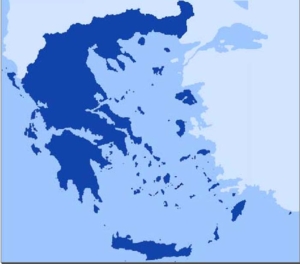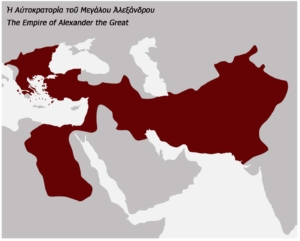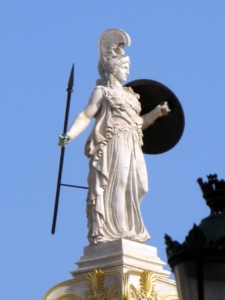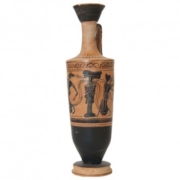Hellas
Hellas, or Greece in English, is the name for the modern-day Hellenic Republic, located in southeastern Europe at the point where the Haemus (Balkan) peninsula juts into the Mediterranean Sea and forms a land-based connection to Asia Minor (Anatolia) and the Middle East. Hellas is also the birthplace and cradle of Western civilization.
The Hellenes have affected and are still affecting every aspect of our lives. Most of our traditions, ways of life, ideas, and culture today can be directly traced back to the ancient Greeks and their great Hellenic civilization.
Greek civilization has influenced Western civilization in a unique and unparalleled way. The Greeks have changed our world. Their civilization is still inspiring us today, and in some aspects, we strive to equal it.
Through the conquests of Alexander the Great, a great Hellene and Macedonian king, Hellenism (Hellenic culture, thoughts, and ideas) spread to other parts of the world.
The Hellenic civilization had a strong influence on the “Roman civilization,” which in actuality is a continuation of the same civilization and is labeled “Graeco-Roman” by historians. By way of their conquests, the Romans carried many features of Greek civilization to far-flung parts of the Mediterranean world and Western Europe. Through Roman mediation, Greek civilization came to be the founding culture of our Western civilization today.
| Alphabet Architecture Democracy Library Olympic games Mathematics Mythology Language Μedicine Foundation of medical practices The Hippocratic Oath Trial by jury Philosophy Athletics (Sports) Art Technology and Science Theater Comedy and Drama Odometer History Vending machines Columns | Stadium Sculpture Mechanical devices Mathematical reasoning Geometry Astronomy Music (Theory & Science) Marathon Alarm clock Umbrellas Cartography (Maps) Anchor Cranes Computer (Antikythera Mechanism, an astronomical calculator) Plumbing Alchemy, a forerunner of Chemistry Basis of geometry Lighthouse Automatic doors Steam engine Clock tower | Urban planning Spiral staircase Arch bridge Surgical instruments Geography Railway Caliper Truss roof Winch Streets Catapult Central heating Astrolabe Escapement Archimedes’ screw Archimedes’ principle Chain drive Double-action principle Levers Watermill Cheese pies Military strategy |
“What the mind and the heart are to a human being, Hellas is to humanity”Johann Wolfgang von Goethe (1749 – 1832). German poet, writer, artist, scientist, and politician.
From the Greek word HELLAS, the words “Hellenic”, “Hellenistic” and “Hellenism” are derived.
“Hellenic” refers to Greece itself.
The term “Hellenistic” refers to the period or era during which Hellenic or Greek cultural influence and power reached the peak of their geographical expansion. Greek culture became dominant in the Mediterranean world and most of Western and Central Asia, even in parts of the Indian subcontinent and spanning as far as modern-day India.
The term “Hellenism” refers to the national character, spirit, and culture of Greece, especially ancient Greece. It is rooted in the history of the Greek people, but it encompasses more than just Greek culture. It is part of humanity’s shared heritage.
‘…and it seems that the name of the Hellenes is no longer denoting a race, but a mentality and one should call ‘Hellenes’ rather those who participate in our education, than those who share our common nature [DNA].Isocrates. Panegyricus (i.e. Celebrating Speech), 50. 4th Century B.C.
Today, Greece is a popular tourist destination and one of Europe’s and the world’s most visited countries. It attracts around 30 million visitors a year, thanks to its rich culture and history, reflected in large part by its 18 UNESCO World Heritage sites.
It is a country offering natural beauty, pleasant weather, cultural attractions, museums, archaeological sites, picturesque villages, sweeping coastlines, marinas, seaside resorts and facilities, pristine beaches, and many stunning and idyllic islands (around 6,000 islands and islets).
Classical tourism, religious tourism, pilgrimage tours, ecotourism, conference tourism, medical tourism, alternative tourism, and seasonal tourism can all be experienced in Greece.
Some of the country’s major and most popular tourist destinations include the capital city Athens, the islands of Thira (Santorini), Mykonos, Rhodes, Corfu, and Crete, as well as the peninsula of Chalkidice.
Whether you are looking for a pleasant and relaxing holiday, an educational or religious tour, or maybe organizing a conference, then Greece is your destination.
Select from our list of tours under Destinations/Greece, or contact us and let us help you organize a unique and memorable visit to Hellas, the birthplace of our Western civilization and home of the gods.
Theodoros Varaklas
HYFELIOS – Travel & Tourism




